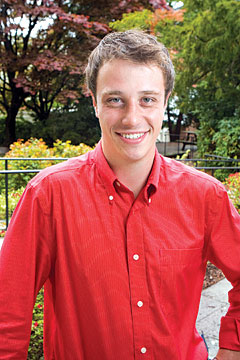Flash forward: while undergraduates cram for finals next spring, they may well be sipping energy drinks brewed by recent Brown graduates with a social conscience. The tea drinks are made from the leaves of a holly plant called guayusa, which is grown in Ecuador and harvested in a fair-trade program. They're produced by the nascent beverage company Runa LLC, which was founded by a team of students in an entrepreneurship class last fall.

The product is for real: MacCombie aims to have it available in the Northeast within a year and nationally within three years. To create the company, the students researched everything from bottling to beverage-industry trends and from community relations to Ecuador's export laws. They won the Brown Entrepreneurship Program's business plan competition ($25,000 in cash and in-kind services) and the student track of the Rhode Island Business Plan Competition ($45,300 in cash and in-kind services).
Runa is for-profit only in beverage sales outside Ecuador. "We have started a foundation, Fundación Runa, in Ecuador," MacCombie says. "All the money made from buying and drying guayusa leaves, making extracts, shipping them to the U.S., and selling them to the company will stay in Ecuador." Runa is hiring an indigenous director for the foundation, and "eventually the majority of the board will be indigenous Ecuadorians," MacCombie says.
A marine-biology honors concentrator who dreamed of a career in renewable energy, MacCombie says he came to Brown "introverted, timid, and unsure of my future." As an undergraduate he helped organize the Brown is Green initiative and its 2008 conference. He also served as a national board member of Students for Sensible Drug Policy; as a summer technology and markets analyst for the Clinton Climate Initiative, where he developed experience in international market trends and sustainability issues; and as a research assistant for Brown's Advisory Committee on Corporate Responsibility in Investment Policies. And he codirected the Political Theory Project's Janus Forum, which promotes political debate on campus.
Now, after a summer of fund-raising and beverage expos, he heads to Ecuador. "It's wild," he says.
This article is adapted from the online publication Today at Brown .





